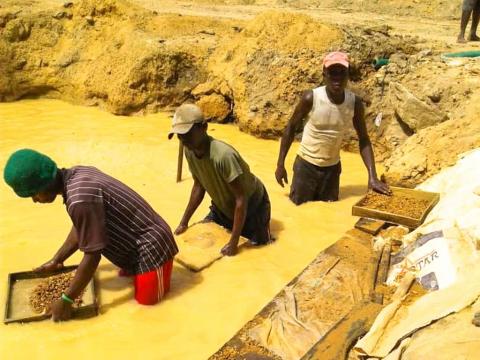By Emma Black
On 31 March 2020, when Sierra Leone recorded its first case of COVID-19, the Government instituted measures to prevent the transmission of the virus. Many of these preventative measures are based on the World Health Organization (WHO) and the US Center for Disease Control (CDC) recommendations. These measures have greatly impacted the lives of every Sierra Leonean.
According to President Bio, on the same day as the first case, 31 March 2020, “The Government has prioritised actions to prevent, protect, and curtail the spread of the highly infectious and deadly coronavirus (COVID-19). We have strongly urged citizens to practise enhanced hygiene practices, social distancing, and cough etiquette.”
But, many Sierra Leoneans are finding these measures difficult to adhere to. This is especially so in the rural or mining areas such as Kenema, where following the dictates of the Government is almost impossible. The preventative measures include wearing masks, hand washing, physical distancing, lockdowns and travel restrictions.
In repeated messages from the Ministry of Health and the Emergency Operations Centre (EOC) Response Team, they reinforce the mandatory wearing of facemasks at markets, on the streets, in local communities and especially at workplaces.
Alieu Musa is an experienced, artisanal miner in the Kenema District. He said, “Yes, we know the COVID-19 virus is in our area but not in our village. We are not using facemasks, like in the city, because it is very hard to work with a facemask. It’s hard to breath.” Musa added, “We don’t have time to think about facemasks or any of the other Government demands.”
The mining sector has been hammered by a 85% drop in mining revenue in April 2020 over April 2019. The Mines Minister, Foday Rado Yokie, said this means big trouble for Sierra Leone as mining accounts for 80% of the export revenue of Sierra Leone.
Musa complained the local price of diamonds has fallen or is being manipulated by diamond dealers, who cannot export but are now hoarding the diamonds bought at ridiculously low rates. “The dealers are using the restrictions under COVID-19 to exploit the diamond miners by paying a pittance for our work. We used to sell diamonds, for example, for a one carat diamond, we could sell for Le1 million (approx. $100 USD) but now they are only giving us Le500,000 ($50 USD). We need the money so we sell because we have to feed our families.”
The WHO and many local groups are championing regular and thorough hand washing with soap and water. A diamond dealer and Vice-President of the Diamond Dealers Association in Kenema, Alpha Jalloh Bundu, said, “After cases of COVID-19 were reported in Kenema, we put a hand washing station with a bucket, water and soap here at the office but at the mines, it’s impossible to do proper hand washing.” He regularly instructs visitors to his office or shop to stop and wash their hands before entering his premises.
Artisanal diamond mining relies on a flow of water to sift gravel in search of diamonds. Miners will toil for hours while standing waist-deep in silty water. To them, they have no need to wash their hands with soap and water.
The WHO and others recommend maintaining physical distance… at least 1-metre (3 feet) between yourself and others. The theory is when people come together you can breathe in the droplets of moisture from people’s mouth or nose that may contain COVID-19 virus. The Government recommends avoiding crowded places like markets, public transportation, shops and workplaces. But, for miners in Kenema, they have to work in teams and it is impossible to maintain a 3-foot separation from their colleagues.
Like other countries with far more cases of COVID-19, the Government of Sierra Leone has tried several measures to get people to stay home and self-isolate. In early April 2020 and again from 3-6 May 2020, the Government issued a national, 3-day lockdown. People were restricted from the streets and shops. People had to stay at home and off the streets. With the total shutdown of businesses, miners were restricted from their workplaces.
Alieu Musa said, “Not only during the lockdowns but on other days too, the Police mount checkpoints and we miners are not allowed to go to our mines outside the village. The Police block all the roads.”
Section Chief, Brima Momoh Biabia, of the Lower Bambara Chiefdom, in the mining areas of Kenema Distract, said, “Visitors are not allowed in the village and villagers are not allowed out. The Police have blocked the roads. It is the Police who are supposed to protect the people.”
The President of the Sierra Leone National Indigenous Miners Movement, in Kenema, Mohamed Koroma, said, “The travel restrictions have hurt business. Many businesses and mines have closed. The inter-district travel ban and the restrictions on movement has meant that people are hungry, they have no money and can’t work. Investors are no longer supporting the miners and cannot get to their mining sites.”
The most pressing concern for the artisanal miners and those in the mining sector in Kenema is not necessarily observing the WHO or Government dictates on preventing COVID-19. Instead, the miners are concerned with the economic impact this virus is having on them, their families and their village. Musa said, “Life is very difficult for us here and the work is hard, physical labour. There is little business now and life is a struggle.” With businesses shutting down, restricted mining sites and impossible to follow preventative measures, the artisanal miners are amongst the most vulnerable to coronavirus and a lagging economy.
This story was a collaboration with the Media and Information Bureau in Sierra Leone and New Narratives as part of the Excellence in Extractives Reporting Project. German Development Cooperation provided funding. The Funder had no say in the story’s content.
Copyright © 2020 Politico Online








